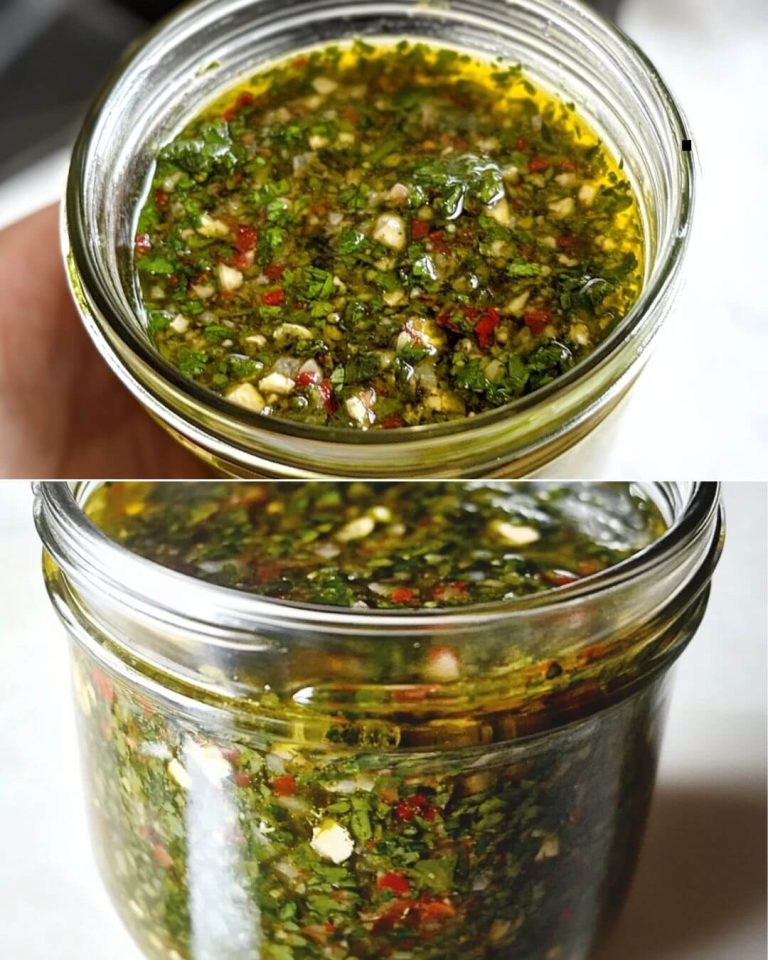This classic Argentinian chimichurri sauce traces its roots back to the gauchos (cowboys) of the Pampas region, who used local herbs and garlic to create a flavorful accompaniment for their grilled meats. Today, this versatile sauce has become a global culinary treasure, celebrated for its bold flavors and remarkable versatility.
Cultural Significance
Chimichurri is more than just a condiment in Argentina—it’s a cultural institution. The name’s origin is debated, with some claiming it comes from ‘Jimmy Curry,’ a 19th-century meat trader, while others suggest it derives from Basque settlers who called the mixture ‘tximitxurri.’
Ingredients
Fresh Components:
- ½ cup (30g) flat-leaf parsley, finely chopped
- 4 cloves garlic (20g), chopped
- 1 shallot (30g), chopped (modern addition)
- 1 small red chili (15g), seeded and diced
Dry Ingredients:
- 1 teaspoon dried oregano
- 1 teaspoon salt
- ½ teaspoon freshly ground black pepper
Liquids:
- 3 tablespoons (45ml) red wine vinegar
- ⅔ cup (160ml) premium extra-virgin olive oil
Instructions
Step 1: Herb Preparation
- Carefully select fresh, vibrant parsley leaves, removing tough stems.
- Thoroughly wash and dry the parsley to ensure optimal flavor.
- Finely chop parsley by hand or prepare for food processor.
Step 2: Creating the Base
- Place parsley, chopped garlic, shallot, oregano, and chili in food processor.
- Add red wine vinegar, salt, and pepper.
- Pulse until ingredients are finely minced but not pureed.
Step 3: Finishing the Sauce
- Transfer herb mixture to a mixing bowl.
- Gradually incorporate olive oil while stirring.
- Allow flavors to meld for 15 minutes at room temperature.
Expert Tips
- Choose Quality Ingredients:
- Use fresh, bright green flat-leaf parsley
- Select premium extra-virgin olive oil
- Opt for fresh garlic cloves, never pre-minced
- Texture Matters:
- Avoid over-processing to prevent a paste-like consistency
- Aim for visible herb pieces in the final sauce
- Temperature Considerations:
- Serve at room temperature for optimal flavor
- If refrigerated, allow to warm before serving
Serving Suggestions
- Traditional: Grilled steaks (especially flank or skirt)
- Modern Applications:
- Drizzle over roasted vegetables
- Mix into rice or quinoa
- Use as a marinade
- Spread on sandwiches
- Top grilled fish or chicken
Storage Instructions
- Keep in an airtight container in the refrigerator
- Maintains freshness for up to 1 week
- Olive oil may solidify when chilled
- Bring to room temperature before serving
- Stir well before use
Nutritional Information
(Per 2 tablespoon serving)
- Calories: 165
- Fat: 18g
- Carbohydrates: 1g
- Protein: 0.2g
- Fiber: 0.3g
- Sodium: 295mg
Yield: Approximately 1 cup (240ml)
Prep Time: 15 minutes
Rest Time: 15 minutes
Total Time: 30 minutes
Recipe Variations
While traditional chimichurri follows this basic formula, regional variations include:
- Red Chimichurri: Adding paprika and red bell peppers
- Uruguayan Style: Including carrots and red peppers
- Modern Twist: Adding cilantro or mint
- Spicy Version: Increasing chili content or adding cayenne
Remember, authentic chimichurri relies on simple, fresh ingredients and proper technique rather than complicated additions. The key is allowing the herbal flavors to shine while maintaining a perfect balance with the garlic and vinegar.
